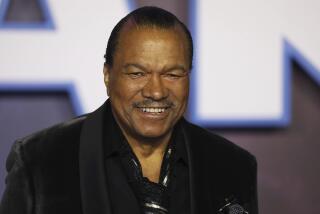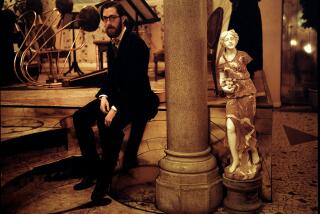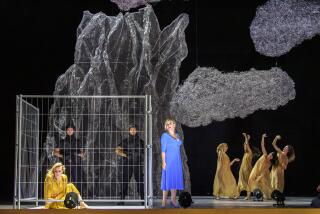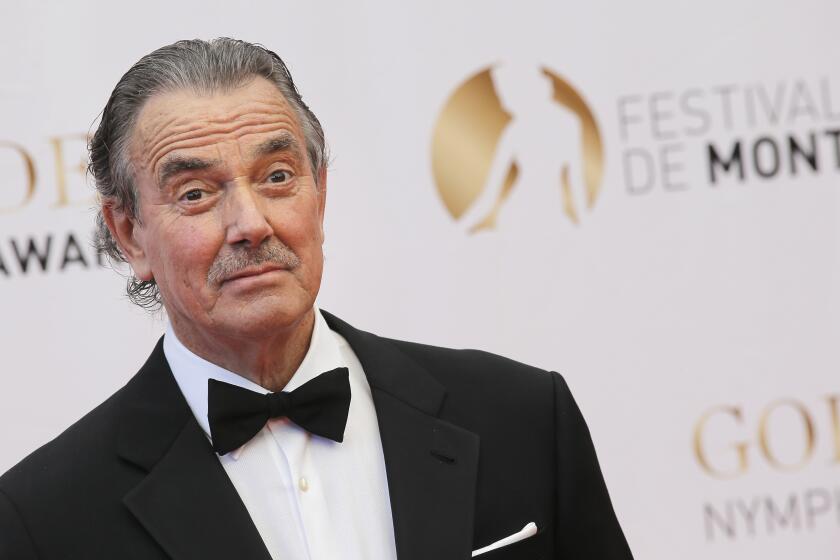‘Doctor Who’ needed a new musical theme. Why the show bet big on little-known composer Segun Akinola
“Doctor Who” fans have spent a few months with their new Time Lord, played by Jodie Whittaker, but they may not yet realize that the show’s first female Doctor has come with a new musical voice playing behind her.
Segun Akinola had scored only a few BBC documentary series and one indie feature when his work caught the ear of Chris Chibnall, creator of the detective series “Broadchurch” and the new showrunner on “Doctor Who.” Chibnall listened to Akinola’s music and responded to “the eclecticism, the heart and the energy.”
“Working with a new composer who hasn’t previously scored multi-episodic drama is thrilling but an undeniable risk,” Chibnall said by email. “You have to take a deep breath and decide whether the risk might be worth the reward. Segun made that risk seem completely negligible, from our very first conversation.”
The composer’s own back story did not exactly make him an obvious choice for a beloved British series that’s been around for 55 years. Akinola was the first member of his Nigerian family born on British soil. He grew up in the town of Luton outside London, the son of an accountant. Even though no one else played music at home, his home life was saturated with it.
“If you’re born to Nigerians, when you’re in the womb you’re probably aware of music happening outside of you,” he said by phone from London. “Nigerians are so vibrant and really love dancing.”
Akinola’s father liked to spin everything from Nigerian folk to Michael Jackson to U2. One day he brought home a keyboard and asked if Segun — whose name means “victory” — wanted to learn how to play. “Sure,” the boy said. And that started his musical journey.
He loved the drums, and after church every week he begged his parents to let him play. He might as well have been allowed to hit any old thing, he said with a laugh, “because I had no idea what I was doing at that point.” Music was clearly where his passion lay.
He took piano and drum lessons, played in all the bands and orchestras at school, and soaked up a range of genres. As a teenager trying to decide what to pursue in higher education, he was scanning his options when his sister wrote on the bottom of the list: “Follow your heart.”
“I literally looked at this and immediately, in that instant, knew that I really wanted to do music,” he said.
Akinola studied composition at the Royal Birmingham Conservatoire and initially thought he might go into record production like his hero, Quincy Jones. But an increasing appetite in films and storytelling — and the realization that Jones also scored movies — pushed him toward the moving image. He attended film school, and before long he was putting it all into practice.
In 2016, he scored the BBC documentary miniseries “Black and British: A Forgotten History,” where he was “able to bring together different strands of myself, musically, for the first time,” he said. “I could really lean into my Nigerian heritage, but also there was the classical side of things, as well as the more contemporary and popular music side of it.”
Then the BBC called and said he was being considered for the newly open role of scoring “Doctor Who.” He met with Chibnall, and the composer asked the showrunner to describe this new Doctor.
“He mentioned hope and warmth, and essentially being quite a steadfast character as well, morally,” Akinola said. The composer went home, and 48 hours later he sent Chibnall a demo of a melody. That music, unchanged, is the Doctor’s theme.
“It encompassed every feeling I wanted the show to have,” Chibnall said. “It had a punch-the-air heroism allied with an emotional sensitivity. It made me beam and it made me cry. It was everything I could ever want.”
Akinola was up front about one minor detail: He never had watched “Doctor Who.” Chibnall, who was starting with a clean slate, said that wasn’t a problem.
The score has new themes for each of the major characters, including the Doctor’s black and Pakistani companions and the TARDIS, the show’s phone booth time machine. Akinola developed a series sound that features a recurring “band” of cello, French horn and guitar, along with some custom sampled voices like a pad made from a plucked piano string and an electronic synth created from his bongos. For some episodes, there’s enough money in the budget to record a small orchestra at Abbey Road Studios.
For the main titles he went retro, slightly revamping the throbbing, early electronic theme created by composer Ron Grainer and the BBC Radiophonic Workshop in 1963.
The show still jumps from planet to planet and back and forth through time, and Akinola’s score acknowledges each new environment. Chibnall aims for inclusivity, and his series is interested in prejudice as a theme; Akinola featured solo trumpet in an episode about Rosa Parks, and a selection of Indian instruments — including tabla, sarangi and male vocals — for an episode in which Yasmin (the Doctor’s companion) visits her ancestors in Pakistan during the partition of India.
“I really, really wanted it to be special, in the sense that I wanted people of that heritage to feel looked after musically,” Akinola said, noting that that’s how Ludwig Göransson’s score for “Black Panther” made him feel about his own roots. “That was a good benchmark, that I wanted people of Indian and Pakistani descent to feel the same.”
Akinola didn’t make a big deal about representation, or that he’s one of very few composers of color scoring a major film or TV franchise. He wanted the conversation to be about the music. But even there, he’s part of a wave of change that is making this beloved old institution look — and sound — more like the world we live in.
“At his core, Segun is a magnificent storyteller,” Chibnall said. “He zeroes in on the heart of the moment, of the sequence, of the episode and of the series. He’s given 1950s America, 1940s India and 17th century England their own specific soundtracks. Never mind deep space and alien planets. He’s brought sounds and performers and collaborators into ‘Doctor Who’ who have never been connected to it before.”
‘Doctor Who’
Where: BBC America
When: 8 p.m. Jan. 1
Rating: TV-PG (may be unsuitable for young children)
More to Read
The complete guide to home viewing
Get Screen Gab for everything about the TV shows and streaming movies everyone’s talking about.
You may occasionally receive promotional content from the Los Angeles Times.






